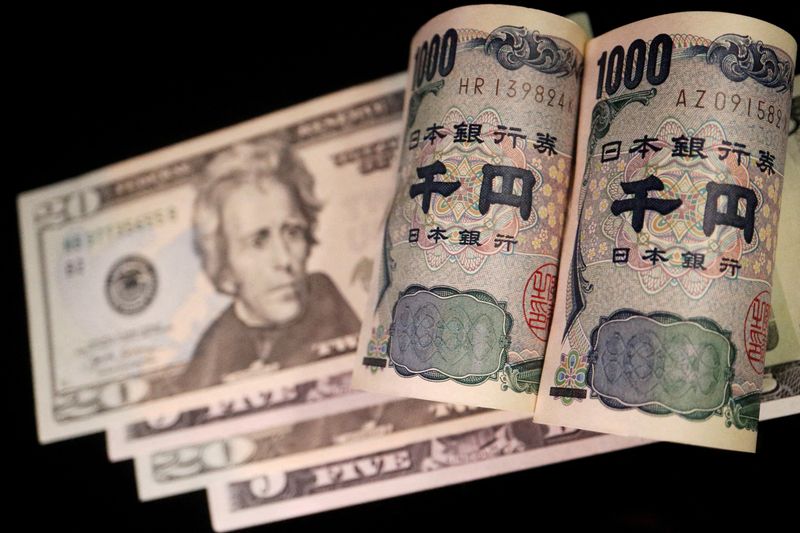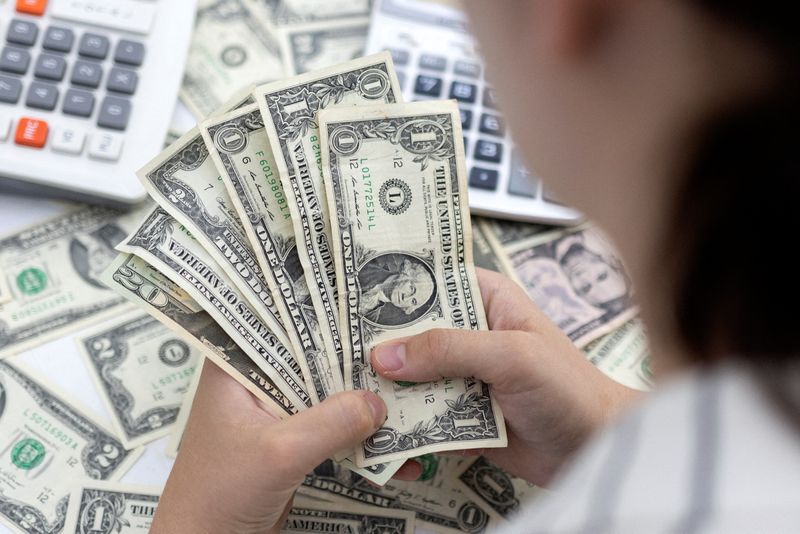By Gertrude Chavez-Dreyfuss and Herbert Lash
NEW YORK (Reuters) - The yen bounced against the dollar on Tuesday after the greeenback rose above a key 150 level, for the first time since October 2022, leading market participants to suspect that there may have been intervention by Japanese monetary officials to keep the yen from falling further.
Japanese Finance Minister Shunichi Suzuki said on Tuesday authorities were watching the currency market closely and stood ready to respond, but also said any decision on currency market intervention would be based on volatility, not specific yen levels.
A senior Japanese ministry of finance official declined to comment on whether Japan had intervened in foreign exchange markets. The New York Federal Reserve did not respond to requests for comment.
The dollar fell as low as 147.30 yen versus the Japanese currency, after hitting a one-year high of 150.165.
Tuesday's low in the dollar was its weakest level in three weeks versus the Japanese currency.
"It looks like intervention though there isn't any official confirmation and the backdrop is not fully convincing. You can say a couple of things, if you just look at the run up in dollar/yen this year versus last year, it's slower," said Colin Asher senior economist at Mizuho in London.
"The finance minister has been quite explicit that he has been looking more at volatility and the speed of any moves rather than levels...so it could just be people expecting intervention and then reacting to what they believed to be intervention."
He noted, however, it is rare for a currency to move so sharply in such a short span of time without some reason. "Such a move is usually intervention."
Other currencies also weakened against the yen, tracking the dollar's fall. The euro dropped to a roughly two-month low against the yen of 154.39 yen and was last down 0.7% to 155.99.
Sterling tumbled to a two-month trough as well against the yen and was last down 0.8% at 179.96 yen.
Others in the market thought it was unlikely an intervention.
"The dollar did get above 150 on the announcement on the JOLTS report," said Marc Chandler, chief market strategist at Bannockburn Global Forex in New York, referring to the U.S. Labor Department's latest Job Openings and Labor Turnover Survey, or JOLTS report.
U.S. job openings, a measure of labor demand, were up 690,000 to 9.610 million on the last day of August. Data for July was revised higher to show 8.920 million job openings instead of the previously reported 8.827 million.
"The dollar-yen came off a lot; people think it's intervention. I don't think so," he said. "Japan intervened three times last year, and none of it was during the U.S. time zone."
Jeremy Stretch, head of G10 FX strategy at CIBC Capital Markets in London, said higher yields on both U.S. Treasuries and Japanese government bonds led to the breakthrough of the 150 threshold.
"The continued uptrend in UST-JGB encouraged the 150 to be breach in the wake of the better-than-expected JOLTS data. One of our traders suggested that authorities may have checked prices which encouraged stops to be triggered."
Strong U.S. manufacturing data on Monday and Federal Reserve officials saying once again that monetary policy would need to stay restrictive for "some time" strengthened the dollar.
In addition, an agreement over the weekend to avert a partial U.S. government shutdown sent benchmark Treasury yields to as high as 4.706% on Tuesday, a 16-year peak. That earlier drove the dollar higher as real interest rates factor in inflation.
The dollar index, which tracks the unit against six peers, was up 0.13% at 107.13, at its highest since November.
The Australian dollar slipped to an 11-month low following the Reserve Bank of Australia's (RBA) decision to hold rates. It was last down 1% at US$0.6299.
The dollar was up 0.5% against the Swiss franc at 0.9221 francs after Swiss inflation dipped and came in slightly below expectations. It earlier hit a six-month high of 0.9244.
========================================================
Currency bid prices at 12:23PM (1623 GMT)
Description RIC Last U.S. Close Pct Change YTD Pct High Bid Low Bid
Previous Change
Session
Dollar index 107.0600 107.0100 +0.06% 3.450% +107.3400 +106.8200
Euro/Dollar $1.0467 $1.0477 -0.09% -2.31% +$1.0493 +$1.0448
Dollar/Yen 149.0100 149.8650 -0.57% +13.65% +150.1600 +147.3000
Euro/Yen 155.98 157.00 -0.65% +11.18% +157.2100 +154.4900
Dollar/Swiss 0.9215 0.9182 +0.38% -0.32% +0.9244 +0.9178
Sterling/Dollar $1.2079 $1.2088 -0.07% -0.12% +$1.2101 +$1.2054
Dollar/Canadian 1.3709 1.3676 +0.22% +1.15% +1.3736 +1.3671
Aussie/Dollar $0.6300 $0.6363 -0.97% -7.56% +$0.6367 +$0.6288
Euro/Swiss 0.9644 0.9619 +0.26% -2.54% +0.9675 +0.9616
Euro/Sterling 0.8664 0.8667 -0.03% -2.04% +0.8691 +0.8659
NZ $0.5901 $0.5948 -0.77% -7.05% +$0.5954 +$0.5888
Dollar/Dollar
Dollar/Norway 10.9820 10.8500 +1.23% +11.91% +11.0210 +10.8490
Euro/Norway 11.4991 11.3717 +1.12% +9.58% +11.5206 +11.3582

Dollar/Sweden 11.1021 11.0400 +0.35% +6.67% +11.1390 +11.0293
Euro/Sweden 11.6222 11.5813 +0.35% +4.24% +11.6420 +11.5658
